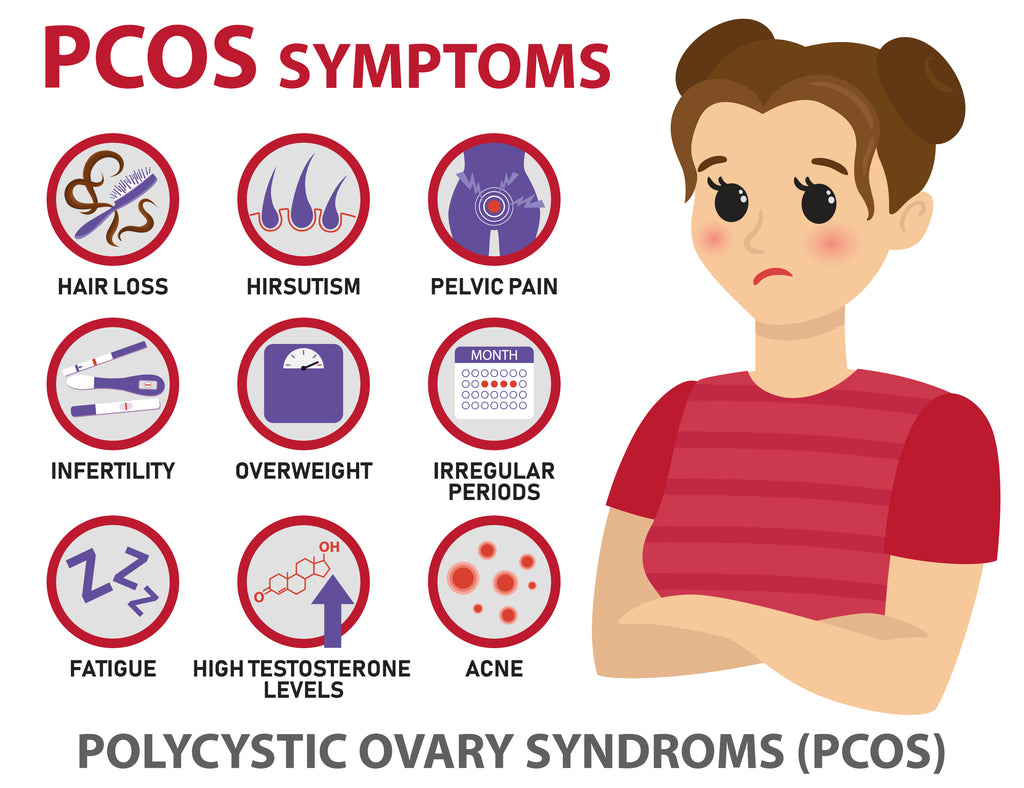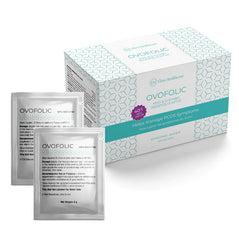Table of contents
Key Takeaways
Understanding PCOS: A Lifelong Women's Health Issue
It was previously believed that PCOS only affects women of reproductive ages. However, recent research suggests that PCOS affects the whole life of a woman. It starts inside the womb, showing symptoms of PCOS problem in females during puberty and progressing during adulthood. Symptoms of PCOS affect the quality of life and put women at risk for the development of multiple morbidities, including obesity, insulin resistance, type II diabetes, cardiovascular morbidities, infertility, cancer, and psychological disorders such as depression and mood swings. Therefore, early diagnosis and treatment are crucial to prevent a threat to mental and physiological well-being.
Symptoms of PCOS: A Wide-ranging Impact
The wide range of symptoms makes the diagnosis of PCOS difficult. These symptoms may vary by age, but PCOS symptoms in females typically manifest as an abnormal production of male hormones (hyperandrogenism), menstrual irregularities, and the presence of polycystic ovaries symptoms, such as cysts in ovaries. Individuals with all three symptoms are at the most risk of developing comorbidities and should be frequently screened. Other symptoms of polycystic ovarian syndrome include excessive body hair (hirsutism), excessive acne on the face, and premature puberty. Furthermore, younger women mainly complain about reproductive and psychological problems while older women complain about metabolic and chronic morbidities.
PCOS Symptoms in Adolescence: A Challenge for Diagnosis
Diagnosis of PCOS is especially difficult in adolescence. Normal physiological events related to puberty tend to mimic signs and symptoms of PCOS.1 For example, a natural increase in male hormone (testosterone) levels during puberty can be mistaken with the abnormal elevation of the hormone, characteristic of PCOS high testosterone, a key sign of PCOS. Furthermore, diagnostic criteria for excessive body hair do not take into consideration individual and ethnic variabilities, and the presence of acne is common in individuals undergoing puberty. This complicates early clinical diagnosis and treatment.
It Takes a Village: The Complex Treatment for PCOS
They have a saying for the treatment of PCOS: it takes a village! Management of PCOS targets the range of symptoms that patients usually present with. This can include visits to a family practitioner, a gynecologist, an endocrinologist, a dermatologist, a pediatrician, a psychiatrist, and a psychologist. Oral contraceptives (OCPs) are usually considered the first line of treatment for PCOS symptoms and treatment. OCPs are effective in lowering male hormone levels. They attenuate menstrual disturbances, help in the management of excess body hair, and prevent thinning of scalp hair.

PCOS Side Effects of Oral Contraceptives: A Double-edged Sword
However, the use of OCPs is controversial. Individuals undergoing OCP treatment might develop a range of side effects and need to be screened for possible side effects of PCOS. OCPs might negatively affect the cardiovascular profile of the individual and can increase the risk of complications such as coronary artery blockage and heart attack.2 OCPs might also worsen the metabolic profile of the individual, cause accumulation of adverse fats in the blood (hyperlipidemia), decrease the action of insulin, and increase the risk for development of type II diabetes.3 Furthermore, women often become aware of their PCOS diagnosis when they face barriers to becoming pregnant. Oral contraceptives prevent conceiving and therefore, cannot be used by individuals planning to get pregnant.
Exploring Inositol Supplements: A Promising Solution for PCOS Symptoms
Inositol supplements hold promising grounds for the management of PCOS symptoms and signs. Emerging research suggests that the use of D-chiro-inositol and Myo-inositol manage excess hair, acne, female-pattern hair loss, irregular menses, male hormone production, infertility, and insulin resistance.4 Management of insulin resistance alone is effective in preventing many cardiometabolic diseases including obesity, type II diabetes, hypertension, whole-body inflammation, metabolic and cardiovascular disorders. Women with PCOS may also take advantage of topical acne treatment and physical hair removal modalities. Doing so can improve body image and increase the self-confidence of the individual.

PCOS Symptoms and Treatment: Lifestyle Modification for Long-term Health
Lifestyle modification with increased physical activity and attention to healthful eating patterns are a part of the management of PCOS-derived chronic comorbidities such as obesity, type II diabetes, ovarian cancer, and atherosclerosis.5
Concluding Thoughts on PCOS: Navigating a Complex Health Journey
In summary, Polycystic Ovary Syndrome (PCOS) is a lifelong health challenge, impacting women with a myriad of symptoms. Its effective management involves a multifaceted approach, including possible use of oral contraceptives, promising inositol supplements, and crucial lifestyle modifications. Navigating PCOS may be daunting, yet proactive management and understanding can greatly enhance a woman's quality of life.
Understanding PCOS: Common Questions Answered
Question 1: What are the symptoms of PCOS?
A: PCOS symptoms typically include an abnormal production of male hormones, menstrual irregularities, and polycystic ovaries. Other symptoms may include excessive body hair, acne, and premature puberty.
Question 2: How is PCOS diagnosed?
A: PCOS diagnosis can be challenging, especially during adolescence. Symptoms like the abnormal elevation of male hormones, the presence of excessive body hair, and acne can help in diagnosing the condition.
Question 3: What treatments are typically used for PCOS?
A: Treatments for PCOS often involve a multifaceted approach, including oral contraceptives to lower male hormone levels, inositol supplements to manage symptoms, and lifestyle modifications to manage chronic comorbidities.
Question 4: Are there any side effects of using oral contraceptives for PCOS?
A: Yes, oral contraceptives for PCOS can have side effects. They may negatively affect the cardiovascular profile, increase the risk of heart complications, worsen metabolic profile, and can prevent conception.
Question 5: What lifestyle modifications can help manage PCOS symptoms?
A: Increased physical activity and healthy eating patterns can help manage PCOS-induced chronic comorbidities like obesity, type II diabetes, ovarian cancer, and atherosclerosis.
Author: Parsa Nafari, Bachelor of Science, Kinesiology
Reviewed by: Dr. Pari Saharkhiz, M.D.
References:
1. Hayek, S. E., Bitar, L., Hamdar, L. H., Mirza, F. G., & Daoud, G. (2016). Poly Cystic Ovarian Syndrome: An Updated Overview. Frontiers in Physiology, 7. doi:10.3389/fphys.2016.00124
2. Stampfer, M. J., Willett, W. C., Colditz, G. A., Speizer, F. E., & Hennekens, C. H. (1989). A Prospective Study of Past Use of Oral Contraceptive Agents and Risk of Cardiovascular Diseases. Studies in Family Planning, 20(3), 181. doi:10.2307/1966576
3. Hee, L., Kettner, L. O., & Vejtorp, M. (2012). Continuous use of oral contraceptives: An overview of effects and side-effects. Acta Obstetricia Et Gynecologica Scandinavica, 92(2), 125-136. doi:10.1111/aogs.12036
4. Wojciechowska, A., Osowski, A., Jóźwik, M., Górecki, R., Rynkiewicz, A., & Wojtkiewicz, J. (2019). Inositols’ Importance in the Improvement of the Endocrine–Metabolic Profile in PCOS. International Journal of Molecular Sciences, 20(22), 5787. doi:10.3390/ijms20225787
5. Yildiz, B. O. (2016). Contraceptives, exercise and diet — are all three needed in PCOS? Nature Reviews Endocrinology, 12(8), 438-440. doi:10.1038/nrendo.2016.106







We have 2 comments. Add your voice to the conversation!
Hello and thanks for reading our blog.
As we mentioned in the blog, PCOS has many signs and symptoms. Each person is unique in how PCOS affects them and the best way to manage their symptoms. Please speak to your doctor about the best treatment plan for you.
_Dr. Pari
Hello. I was told that I have PCO ovary, but I don’t have excessive hair
+ Open to leave a Comment